This creamy and rich chicken liver pâté recipe is full of buttery, fatty flavor and amazing to eat with even just a slice of baguette. You will most likely see Vietnamese pâté in bánh mì and it’s the perfect amount of extra flavor that boosts the sandwich’s flavor.
If you want to make bánh mi at home and don’t want to use the canned varieties you find at Lee’s sandwiches or at your local Vietnamese grocery store, this recipe is easy to follow and will give you extra batches to share with friends and family (or to make tons of bánh mì).
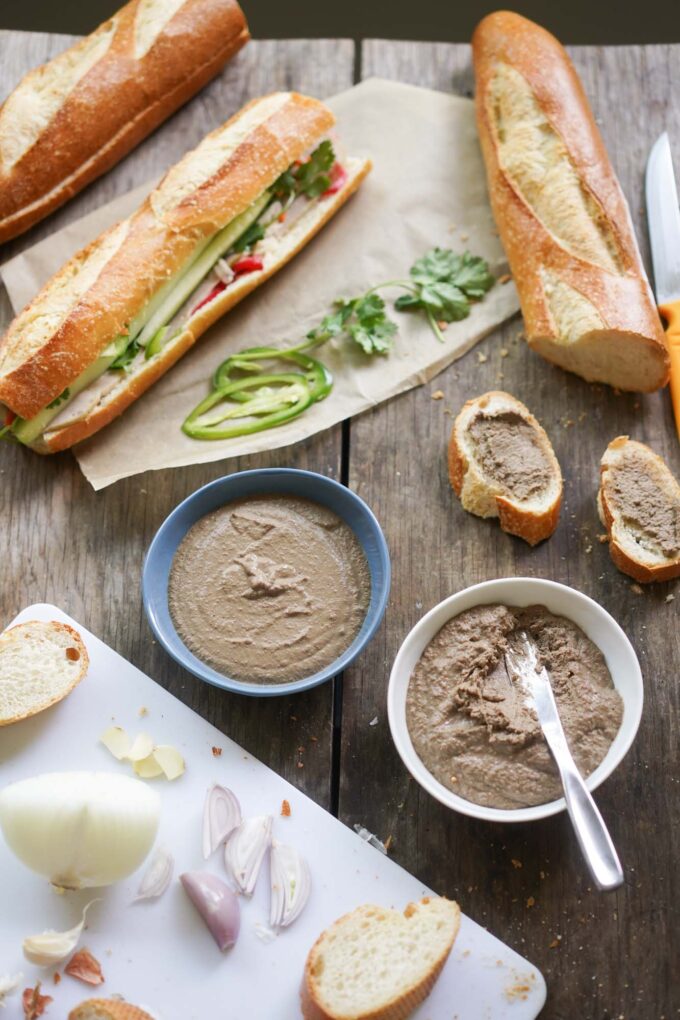
Background
Pâté is generally a type of meat paste with a main ingredient of liver, but you can also find other types including ground meat of pork, beef, or even chicken.
While there are different types of pâté from all over the world, Vietnamese pâté was introduced by French colonialism and cuisine. Different French variations of pâté include a baked crust version (pâté en croûte) where it’s similarly baked like a pie or a pâté en terrine where it is baked in a mold usually in a water bath in the oven.
Not to be confused with pâté chaud, which is a meat pie that is made of ground pork or beef (and not liver). pâté is essentially a formed meat pie, but it’s known that pâté chaud has origins from a seafood stuffed pastry–not technically the forcemeat (or grounded and molded meat) version we know pâté to be these days.
The Vietnamese version of pâté is called pâté de campagne, or country pâté; This usually has a coarser texture and is traditionally made with cheaper ingredients like pork liver because they could not afford to make the traditional chicken or goose liver pâté. These days, there are plenty of pâté versions that are made with chicken and pork livers.
Prep & cooking chicken livers
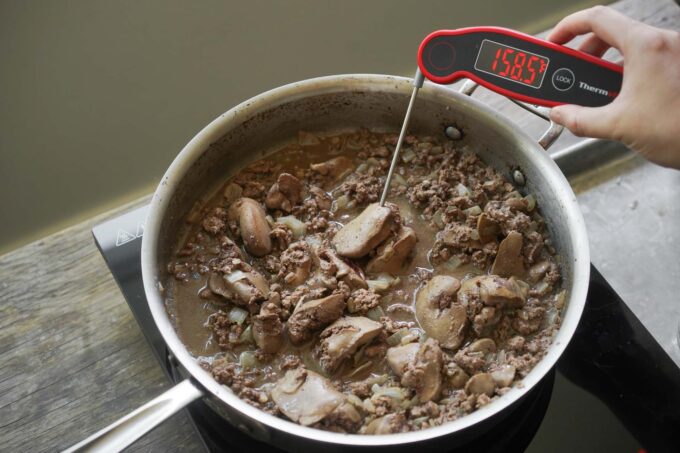
Chicken livers have somewhat of a bad rap to them because of their iron taste, but I feel like it’s definitely misunderstood. After learning a few adjustments in my cooking, I realized chicken livers can have a flavorful profile.
Before I even start to cook my chicken livers, I like to soak them in a milk bath overnight. I know I know, this sounds like a LONG time, but it’s definitely worth it. The milk helps to remove some of the gumminess in the texture and also mellows out the flavor.
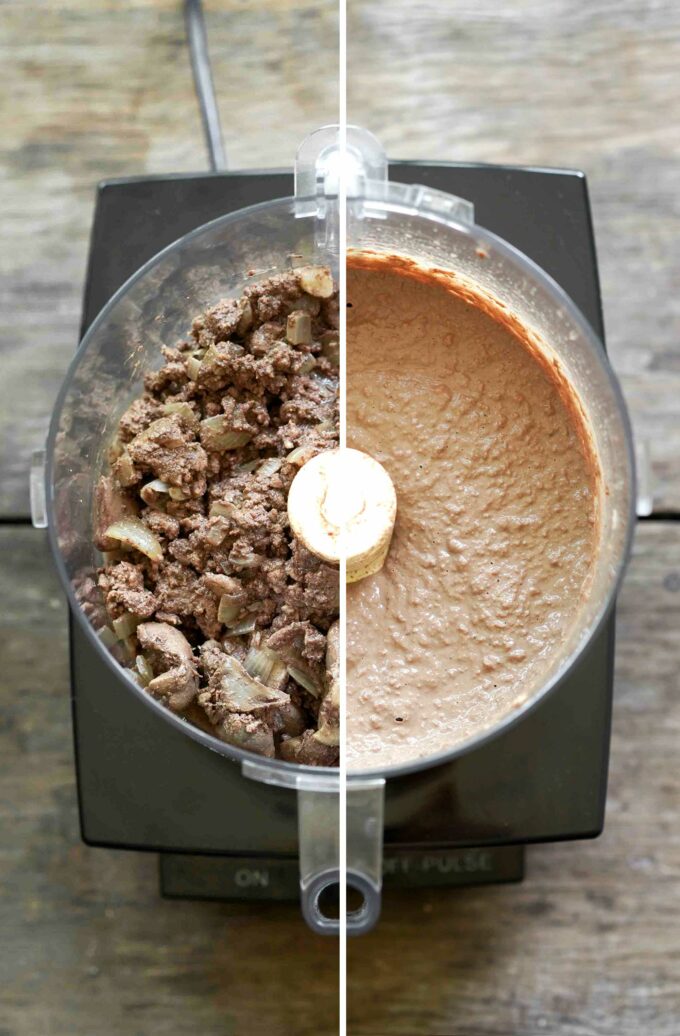
One of the easiest things about this recipe is that you don’t need to bake or water bath this pâté to cook it. All the cooking is done over the stove and then pulsed in a food processor.
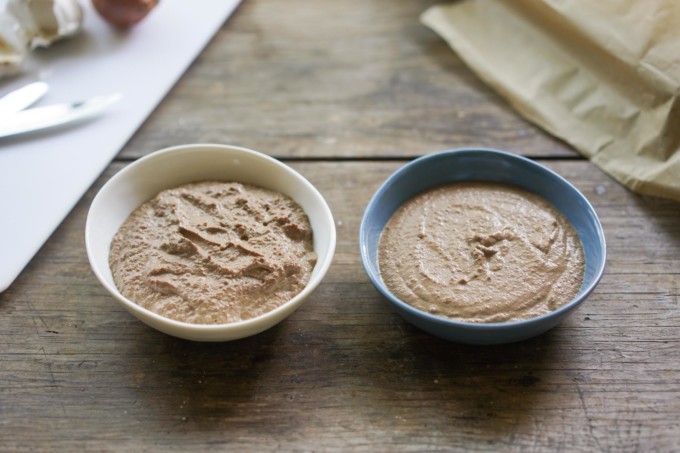
Even though this is a rustic type of pâté that is often more coarse than other types, I still like the option of straining it to remove the chewy pieces of ground pork.
Serve
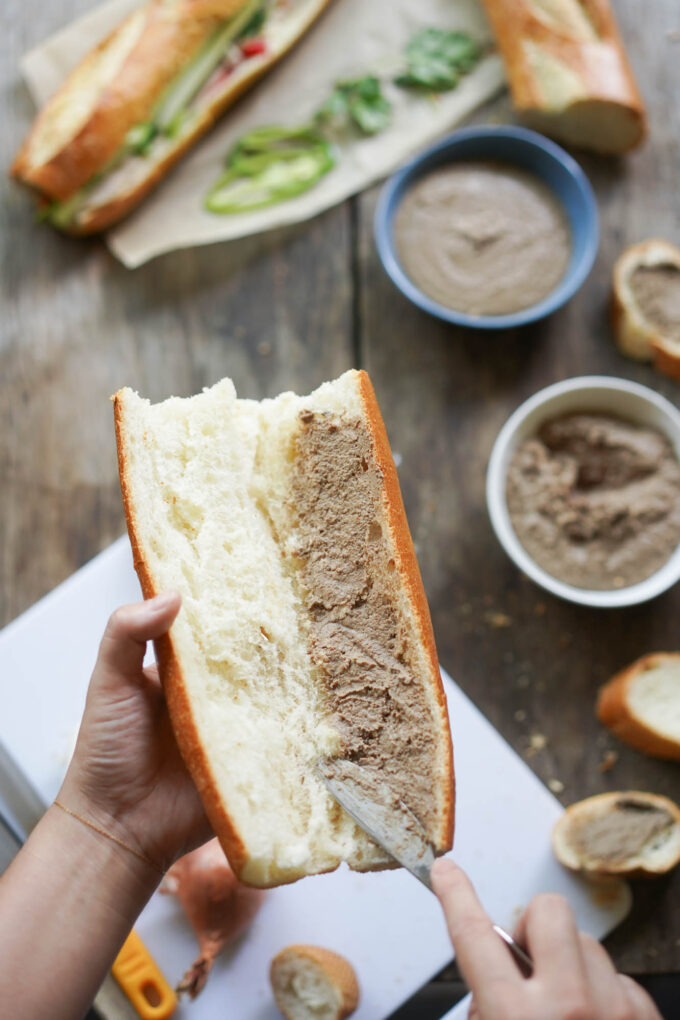
Sometimes when I buy bánh mì sandwiches, I find that there’s never enough pâté inside so I love having the option of adding more when I make homemade pâté. Other ways I like to eat pâté is also on a cheeseboard with plenty of crackers and Stilton cheese.
Tips
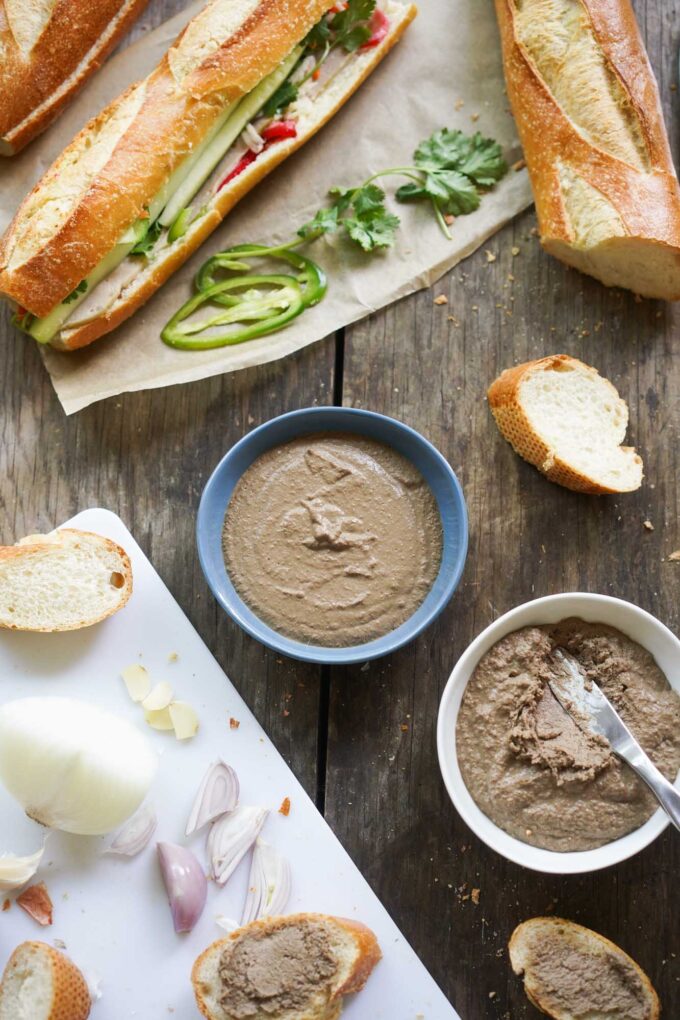
- Remove stringy tendons and fatty white/yellow parts when prepping the livers. This will help prevent more chewy pieces in the pâté.
- Soak the livers in milk overnight in the fridge. While this obviously is a long time to wait, soaking the livers in milk helps reduce the gumminess and mellow out the flavor of the livers. If you don’t have enough time, I would still suggest at least 3-4 hours soaking in the fridge.
- Don’t overcook livers in the pan. I like to use a meat thermometer to test the livers while cooking to make sure I’m not overcooking them. Otherwise, they will start to taste very bitter and dry or tough. I stop cooking once the livers hit 160 °F because I know they will continue to cook a little more while they cool.
- Cool your livers and ground pork mixture before processing. This allows the sauce to slightly thicken, cook the livers a little more without overcooking, and doesn’t give you a hot mess when you try to pulse them into a pulp.
- Option to strain. While pâté de campagne is known to be coarse, I still like to strain the pâté before putting them in the mold to remove the chewy ground pork pieces. This is optional.
- Line your molds with plastic wrap to make it easier to remove after they have firmed up.
- Add a layer of clarified butter on top to help seal the surface and prevent the pâté from drying up.
- You can freeze the pâté if you have extras and defrost them for later use as well.
How long can you keep chicken liver pâté?
In the fridge, chicken liver pâté is only good for a few days. You also have the option for freezing leftover untouched pâté.
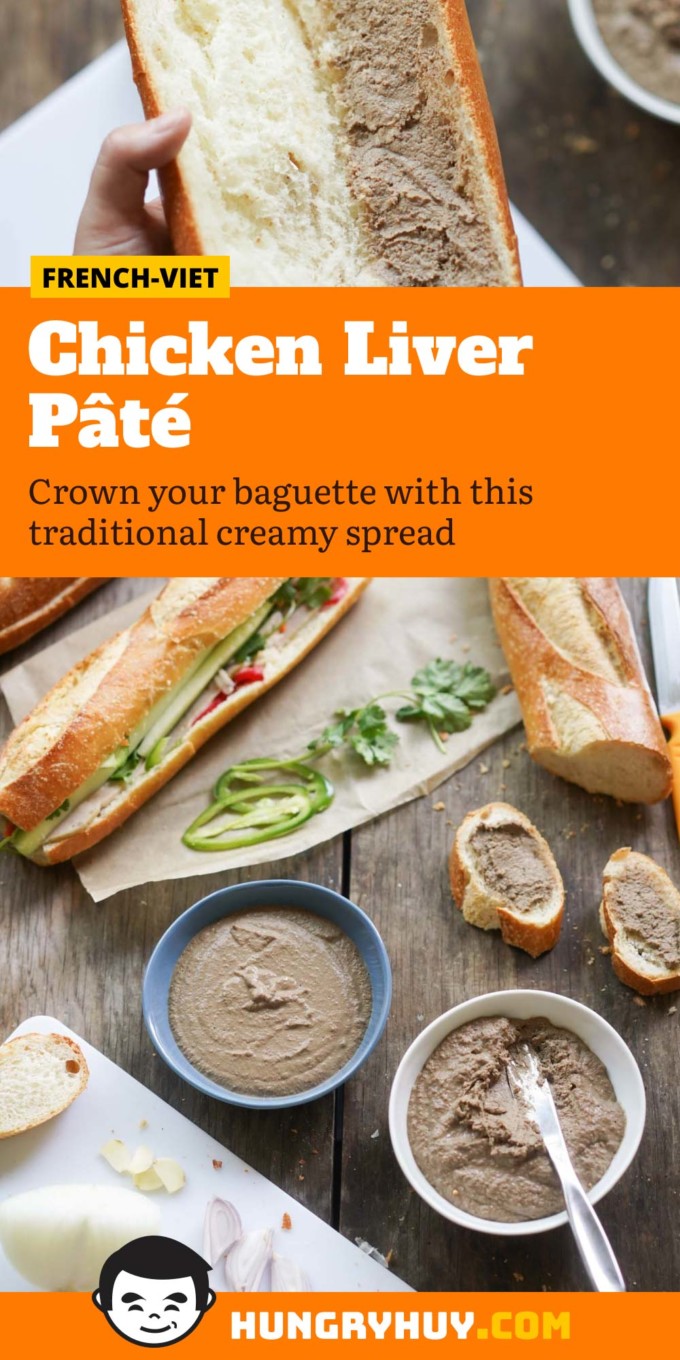
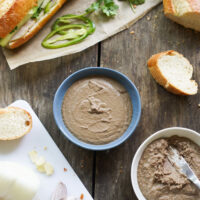
Chicken Liver Pâté (great for bánh mì)
Ingredients
- 1 lb (453.6 g) chicken livers
- 1 c milk
- ½ lb (226.8 g) ground pork minced
- 1 tbsp vegetable oil
- ¾ c yellow onion (about 1 small onion) chopped
- 1 tbsp garlic (about 5 cloves) minced
- 4 tbsp butter unsalted
- 2 tsp white sugar
- 1 tsp fish sauce
- 1 tbsp heavy cream
- 1 tbsp bourbon
- 1 tsp salt
- ½ tsp black pepper
Equipment Used
- blender (optional)
Instructions
- Prep liver by cleaning the livers under running water to remove any random debris and using a knife to cut out fatty pieces or dark brown spots.
- Put the livers into a glass container, pour milk until it covers all of the livers, and cover with a lid. Marinade the livers in milk overnight in the fridge.
- The day after, remove the livers from the fridge, transfer them into a strainer to remove the excess milk, and rest on the counter to get to room temperature (about 20 minutes before cooking).
- Place the ground pork in the food processor and grind until it’s minced.
- In a large saucepan over medium heat, add the vegetable oil and saute the onions for about two minutes or until fragrant, then add the garlic and saute for another one minute. Add the butter and stir until it melts.
- Add the chicken livers and ground pork in the saucepan and simmer for 2 minutes.
- Then, mix in the other ingredients into the saucepan and cook for about 7 minutes or until the liver’s temperature measures to about 160 °F and it feels firmer to the touch. The whole cooking time should not take longer than 15 minutes.
- Turn off heat and let the liver mixture come to room temperature for about 30 minutes.
- Once it’s cooled down, add everything into a food processor and chop until it’s smooth. Option to strain if you want a smoother texture.
- Transfer the pâté to containers and cling wrap over the top of the container to prevent the pâté from drying out. Chill in the fridge for at least 2 hours to let it form.
- Optional: line containers with cling wrap to prevent it from sticking after forming in the fridge. I like to use airtight containers with a lid so the pâté will stay fresh in the fridge. You also can add a top layer of clarified butter to further keep the pâté from molding.
- Transfer the pâté from the fridge and onto a serving container and eat immediately. Fresh pâté can be stored in the fridge for up to three to four days. You can also freeze untouched pâté too.

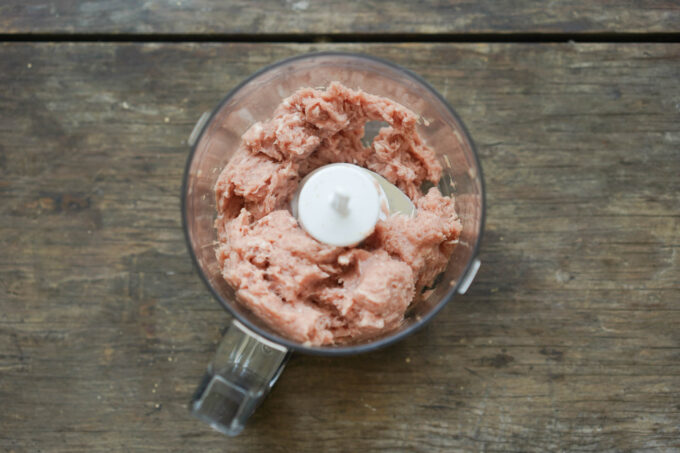
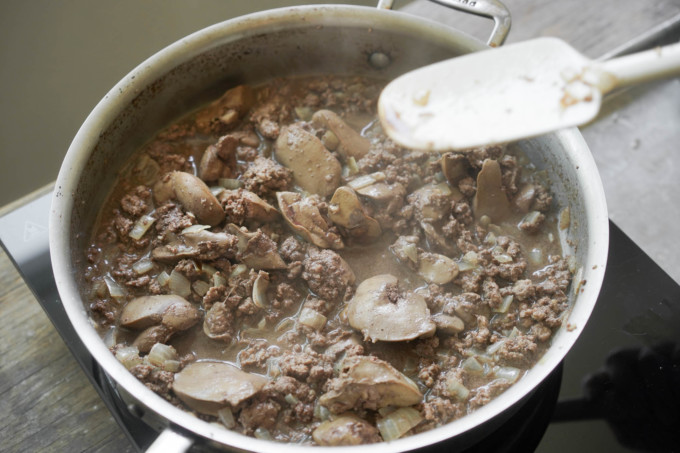
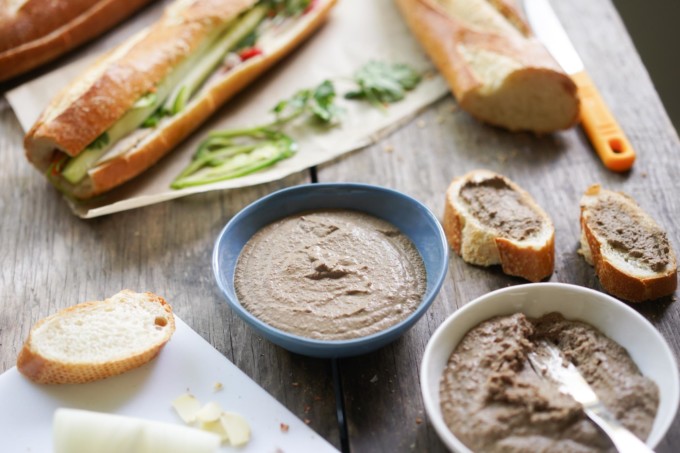









Great
Ok, is it pork or chicken pate?
Marie, it’s chicken liver but yes there’s pork in it.
Thank you very much for pâté recipe !LI will try soon !It’s easy to follow your cooking 👍👍👍🤗🤗🤗🤗🤗
Thanks Ngoc!
Thank you for the recipe. Second time I did not add sugar since I used sweet opinion and triple the cognac
Thanks for the mod tips Olivia!